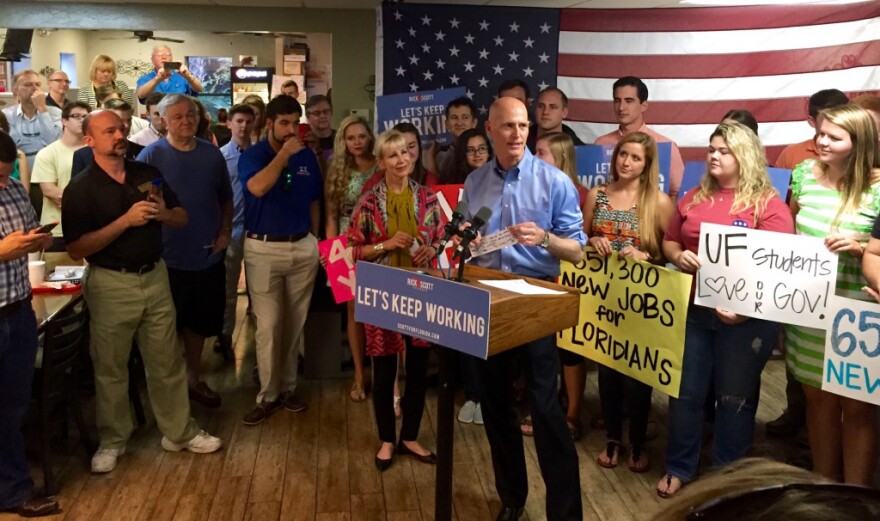He seemed more at ease here, speaking to a crowd of about 100 to 150 supporters, than he does in major speeches or even press conferences in Tallahassee. Gov. Rick Scott --- light blue shirt sleeves rolled up --- implored people to vote, early if possible.
"I tell people all the time, this election is not about Charlie Crist or Rick Scott," he said Tuesday. "It's about you. What do you want? Do you want more jobs, or do you want less jobs?"
Like former Gov. Charlie Crist, his former Republican predecessor and current Democratic rival, Scott is dashing across the state in the final days of the most-expensive and perhaps the nastiest gubernatorial contest in Florida history, pushing for his voters to turn out. Polls show the race deadlocked --- some show it as an exact tie, margin of error or not --- and Scott and others on his "Get Out the Early Vote Bus Tour" are stressing the importance of every vote.
"We will win this election, but we're going to win this election because of you," Scott said a couple of hours later at a barbecue restaurant in Gainesville, where a smaller group of supporters gathered.
The crowd at Ocala was stereotypically older than the one that greeted Scott in Gainesville, and the differences showed up in what moved the crowds. The audience in Ocala didn't react much to Scott's promise to keep tuition low; in Gainesville, it might have been his biggest applause line in terms of policy.
Scott's stump speech itself is something of a closing argument, focused on the turnout pitch and the governor's "Florida 2020 Plan" --- a vision statement that includes $1 billion in tax cuts, greater funding for education and better infrastructure. In Ocala, Scott drew a direct line from his signature issue of the economy, singlehandedly responsible for getting him elected four years ago, to other politically popular issues, like money for public schools, that require tax revenues.
"The only way you have a government that can do anything for us, whether it's law enforcement or education, whatever the issue is --- health care, whatever --- is (to have) a good economy," he said.
But during a campaign in which every inch of ground is contested, Scott and Crist also squabble about who has done more to help out in early voting. Crist's campaign emailed reporters Tuesday to mark the six-year anniversary of the then-Republican governor Crist's decision to sign an executive order to extend early voting hours.
Scott signed a bill in 2011 that rolled back early voting days, then partially undid that two years later, after long lines plagued the state's elections in 2012.
"Rick Scott does not want to make it easier for Floridians --- particularly Floridians of color --- to vote," Crist spokesman Brendan Gilfillan said in the email. "And when a governor is scared of folks voting even after he's spent $125 million to convince them to like him ... well. That says it all."
Asked about the criticism after the Gainesville rally, Scott shot back.
"We have more voting hours than when Charlie was governor," he said. "We have more voting locations. Let's go back and let's look at results. In 2012, we had the most number of voters in the history of the state of Florida --- I think it was 8.5 million people voted in that election. So what we've actually done is, we've done way more than Charlie ever did."
But while the 2013 measure did allow for more flexibility in selecting early voting sites and more hours, it made many of the additional voting hours voluntary for local elections officials.
Scott's pitches resonate with his supporters in different ways. DeLena May, a delegate to the 2012 GOP convention who showed up at the Gainesville restaurant to get her Rick Scott T-shirt autographed, worried that future generations wouldn't have the chance to enjoy the same financial success she said she's had --- especially without Scott's efforts to reduce taxes and regulations.
"There's no way with the regulations and the taxation heaped on us ... that my son had that opportunity," she said. "And my grandchildren? There is no way. There is a big dream-catcher above their heads."
Meanwhile, Adam Cross --- a senior philosophy major at the University of Florida and chairman of the Florida Federation of College Republicans --- said Scott's tuition message will resonate with college voters. Cross had to pay his own way through state college and is doing much the same at UF, with some help from his father.
Scott signed a bill largely repealing a law that allowed 15 percent annual tuition increases without legislative approval. UF and Florida State University can request increases of 6 percent a year if they meet certain conditions, but haven't asked for those increases yet.
"Even a 15 percent increase every year doesn't sound like much, but it's huge when it comes to student loans and whether or not I can attend a school that's a little bit better," Cross said.



